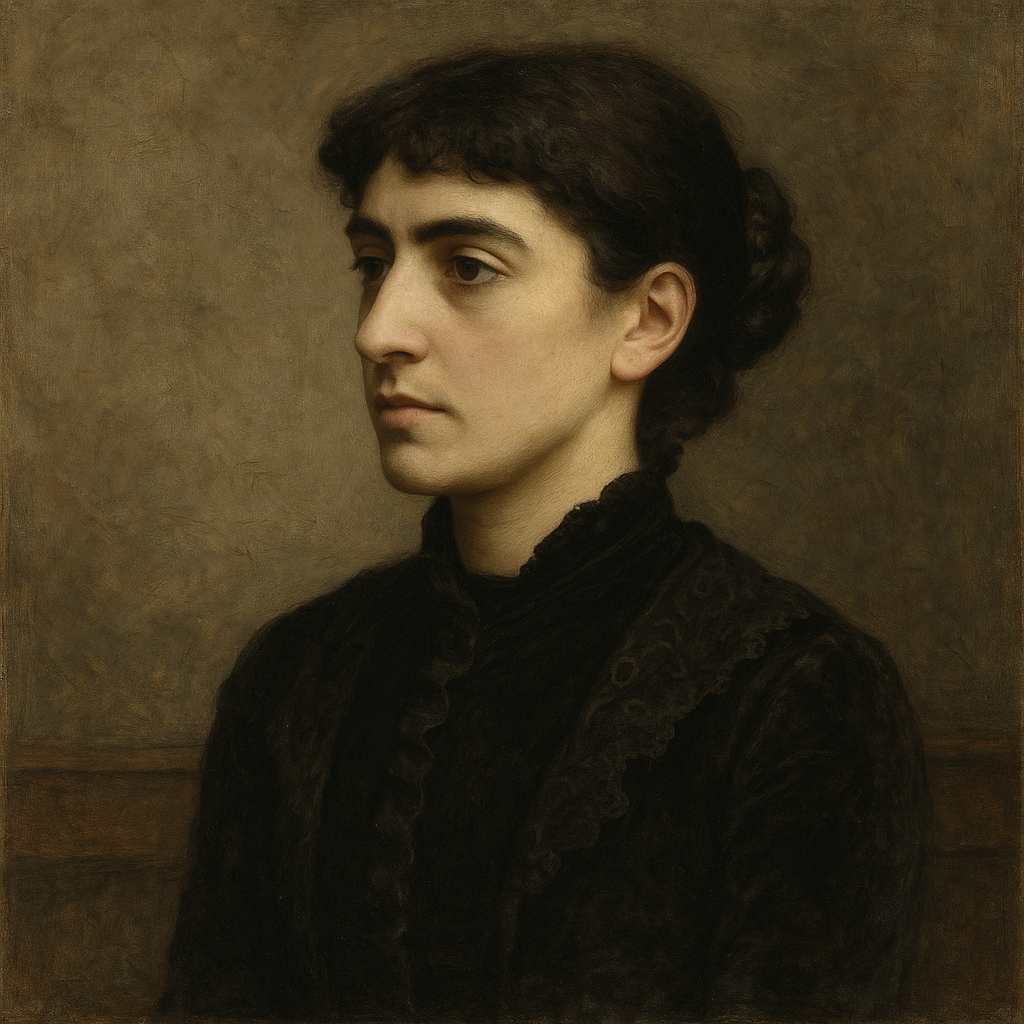2 Poems by Amy Levy
1861 - 1889
Amy Levy Biography
Amy Levy, born on November 10, 1861, in Clapham, London, was a British poet, novelist, and essayist whose tragically short life belied her profound impact on late Victorian literature. As the second daughter of Lewis Levy and Isabelle Levin, Amy grew up in a cultured, middle-class Anglo-Jewish family that valued education and intellectual pursuits. This environment nurtured her precocious literary talents, which began to manifest at an early age.
Levy's formal education was notable for its time. She attended Brighton High School for Girls, where she excelled academically and began to hone her writing skills. In 1879, at the age of 17, she made history by becoming the first Jewish woman to be admitted to Newnham College, Cambridge. This achievement was a testament to her intellectual prowess and determination, as well as a reflection of the gradually expanding opportunities for women in higher education during the late 19th century.
During her time at Cambridge, Levy's poetic voice began to take shape. Her first collection of poetry, "Xantippe and Other Verse," was published in 1881 when she was only 20 years old. This work, which included a dramatic monologue in the voice of Socrates' wife, demonstrated Levy's early fascination with Greek culture and her ability to inhabit diverse personas in her writing. The collection also showcased her engagement with feminist themes, a concern that would remain central to her work throughout her career.
After leaving Cambridge in 1881 without taking a degree—a common occurrence for women at the time—Levy embarked on a period of travel and intense literary production. She spent time in Germany and Switzerland, experiences that broadened her cultural horizons and provided inspiration for her writing. It was during this period that she began to grapple more deeply with questions of identity, particularly concerning her Jewish heritage and her place as a woman in Victorian society.
Levy's poetry is characterized by its technical sophistication, emotional depth, and unflinching examination of social issues. Her second collection, "A Minor Poet and Other Verse" (1884), further established her reputation as a significant voice in late Victorian poetry. The title poem, a dramatic monologue in the voice of a struggling poet, reflects Levy's own anxieties about her place in the literary world and her struggles with depression, a condition that would plague her throughout her life.
While Levy is primarily remembered as a poet, her literary output was diverse. She wrote three novels: "Romance of a Shop" (1888), "Reuben Sachs" (1888), and "Miss Meredith" (1889). "Reuben Sachs," in particular, caused controversy within the Jewish community for its satirical portrayal of Anglo-Jewish society. The novel's critique of materialism and its complex exploration of Jewish identity in Victorian England demonstrate Levy's willingness to confront difficult subjects in her work.
Levy's essays and short stories, published in various periodicals, further showcase her range as a writer. Her essay "Women and Club Life," published in the Women's World magazine in 1888, reflects her engagement with the feminist movements of her time. She was also a contributor to Oscar Wilde's periodical The Woman's World, indicating her connection to the aesthetic and decadent movements of the late 19th century.
Throughout her career, Levy struggled with depression and feelings of isolation. Her poetry often reflects these inner turmoils, with themes of loneliness, unrequited love, and social alienation recurring throughout her work. The poem "A London Plane-Tree," which gave its title to her posthumously published collection, is a poignant exploration of urban solitude and the search for beauty in unexpected places.
Levy's sexuality has been a subject of scholarly debate. Some critics have interpreted her close friendships with women, particularly the writer Vernon Lee, as evidence of lesbian desire. Poems such as "To Vernon Lee" and "New Love, New Life" have been read as expressions of same-sex love, adding another layer to our understanding of Levy's complex identity and the constraints she faced in Victorian society.
Tragically, Amy Levy's life was cut short when she died by suicide on September 10, 1889, at the age of 27. Her death sent shockwaves through London's literary circles and was mourned by contemporaries such as Oscar Wilde, who wrote a touching obituary praising her talent and lamenting the loss to English literature.
In the years following her death, Levy's work fell into relative obscurity. However, the late 20th and early 21st centuries have seen a resurgence of interest in her poetry and prose. Feminist scholars and literary historians have reevaluated her contributions, recognizing her as an important voice in late Victorian literature and a precursor to modernist poetry.
Amy Levy's life and work offer a window into the complexities of identity, gender, and creativity in late 19th-century England. Her poetry, with its technical skill and emotional honesty, continues to resonate with readers today. Her novels and essays provide valuable insights into the social and cultural tensions of her time, particularly regarding the position of women and Jews in Victorian society. Despite the brevity of her career, Amy Levy left an indelible mark on English literature, challenging conventions and paving the way for future generations of women writers.
This text was generated by AI and is for reference only. Learn more
Username Information
No username is open
Everything is free to use, but donations are always appreciated.
Quick Links
© 2024-2025 R.I.Chalmers (V2Melody).

All music on this site by R.I.Chalmers (V2Melody) is licensed under a Creative Commons Attribution-NonCommercial 4.0 International License.
Attribution Requirement:
When using this music, you must give appropriate credit by including the following statement (or equivalent) wherever the music is used or credited:
"Music by R.I.Chalmers (V2Melody) – https://v2melody.com"
Support My Work:
If you enjoy this music and would like to support future creations, your thanks are always welcome but never required.
Thanks!



